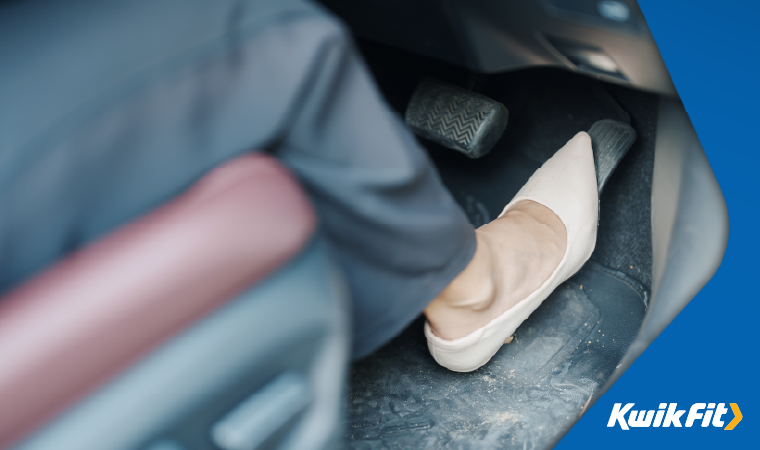Is It Illegal To Drive In Flip Flops, Sandals, Or Swimwear?
Jessica Bird | Thursday 3rd July 2025 8:09am

If youíve spent a day on the beach or relaxing in the sun, the last thing you want to do is get into a hot car and make the drive home. So, it can be tempting to skip a few steps - like driving home barefoot to avoid sandy feet in shoes, or opting for sandals or flip flops for ease. But, in neglecting your trainers for the journey home, are you actually breaking any laws?
While most of us are up to scratch with our general Highway Code knowledge, itís surprising how many motorists donít know what the rules are surrounding suitable footwear and getting behind the wheel.
Read on to find out what the law really says about driving barefoot and in flip-flops.
Can you drive in flip-flops?
If you think boots or trainers are really going to ruin your look, youíre in luck. There are no official UK laws that prevent drivers from wearing flip-flops while operating a car. By law, you canít be prosecuted for the sole act of wearing flip-flops while driving (pun intended), if you are able to keep the vehicle under control and drive safely.
Not illegal, but ill-advised
However, if wearing unsuitable footwear causes you to lose control over your vehicle or inhibits you from driving safely, thatís another matter. There may not be specific legislation prohibiting driving in ďsummer shoesĒ, but the law does stipulate that drivers must always maintain proper control over their vehicles. If your footwear prevents you from doing so, then you are breaking the law - and may face consequences.
Donít get caught out...
While you can technically wear open-toed shoes or shoes with heels (and so on) to drive, whether you should is another matter altogether - especially if you want to ensure the safety of your passengers and other road users.

Should you drive in flip-flops & sandals?
Open-toed shoes like sandals arenít designed for driving like trainers or plimsoles are. Not only do they have reduced grip, but they also lack the secure fastenings to keep your feet in the shoe. Below are some of the main risks associated with driving in unsuitable footwear like flip-flops:
- Poor grip: Flip-flops have minimal traction, meaning that your feet are much more likely to slip off the pedals or miss the pedals in emergency situations where fast response times are critical.
- Reduced accuracy: These types of shoes allow your feet to move freely, preventing accurate pedal control and responsive braking (EG: it may be harder to push down the pedal softly or firmly).
- Distraction: If your shoes slip off while driving, you may get distracted trying to locate it and put it back on while keeping your eyes on the road, potentially causing you to swerve or miss hazards.
Is it illegal to drive barefoot?
But, what about no shoes at all? If you hate the feeling of sandy feet in socks and shoes after the beach, it really is tempting to leave the footwear out altogether. Just like flip-flops, though, while driving barefoot is not against the law, itís ill-advised due to safety reasons.
While you are within your rights to pop your pumps on the passenger seat and drive barefoot, itís important to remember that, if an accident occurs or youíre caught driving dangerously and your footwear (or lack thereof) is found to have contributed, there can be penalties.
Why shouldn't you drive barefoot?
Driving barefoot is not the norm for a reason. As drivers, weíre used to the feeling of shoes and the amount of pressure we need to apply to the pedals while wearing them. Without shoes, your ability to gauge is thrown off, and youíll likely be braking too slowly or too suddenly.
Itís unsurprising to note that your feet also have way less grip than a decent pair of trainers ó not to mention the fact that your feet may get slippery when sweaty or wet. All of those factors combined make it much more difficult to drive without shoes, and all the more logical to don your trainers before heading home, no matter how hot you are.
Can you drive in swimwear?
If youíre heading home from the beach in your swimwear or beach gear (perhaps you got too cold and dashed to the car, or just couldn't be bothered to change), what does the law say?
Again, not illegal! But not sensible either. You need to be comfortable when you drive and not be distracted by clothing. Hereís why you might want to don a t-shirt before setting off:
- Your seatbelt might not function safely over swimwear (causing burns or harm to your skin).
- You may get too cold and look to grab a jumper from the backseat ó taking your eyes off the road.
- Or you may feel restricted in your movement, failing to operate the vehicle controls safely.
Wet, unsuitable clothing does not make for a focused, comfortable, safe ride home. This is all to say: donít drive in a wetsuit or a bikini. Be safe.

What does the law actually say about driving attire?
Weíve established that driving barefoot or in swimwear or sandals isnít technically illegal, but what does the law actually say to motorists looking for guidance? And is it possible to be persecuted for these acts?
The Highway Code, Rule 97
Rule 97 of the Highway Code stipulates that, before setting off, you should make sure that your ďclothing and footwear do not prevent you from using the controls in the correct mannerĒ. This means the shoes that youíre wearing should not interfere with your control of the vehicle, nor inhibit your ability to drive safely.
Road Traffic Act 1988, Section 41D
The Road Traffic Act stresses the importance of having control over a vehicle, stating drivers should not drive ďa motor vehicle in a position which does not give proper control or a full view of the road and traffic aheadĒ. While this rule doesnít explicitly mention clothes, the phrase ďin a position which does not give proper controlĒ can extend to footwear choices impeding correct foot placement on a pedal (causing delayed braking and potential collisions, etc).
Road Traffic Act 1988, Section 3ZA
Under the ĎDriving Without Due Care and Attentioní section of the Road Traffic Act, there are a number of rules that outline how drivers must be competent and careful behind the wheel. To quote the Act: ďA person is to be regarded as driving without due care and attention if [...]the way he drives falls below what would be expected of a competent and careful driver.Ē
If your footwear causes you to drive recklessly or without ďdue care and attentionĒ you could face penalties of £100 and three points on your license. If the matter goes to court, the cost and points increase further!
Don't slip up on road safety
Be it a cheap pair of flip-flops folding on the pedal or too-sudden braking when barefoot, donít slip up on road safety by wearing the wrong driving attire. Follow the tips below to drive safer and stay compliant with UK law and Highway Code regulations:
- Keep a spare pair of shoes handy. If youíre planning to live at the beach all summer, keep a spare pair of trainers in the boot of your car or on the passenger seat.
- Keep a towel and some socks handy too. If itís dreaded sand thatís preventing you from wearing shoes on the drive home, keep a clean pair of socks and some wet wipes or a towel in your car.
- Use the AC. If youíre reluctant to wear proper footwear or clothing because youíre too hot, you can always direct the air conditioning vents to reach down to your footwell, cooling off your feet in seconds.
- Pack suitable clothes. You canít drive if youíre distracted by being too hot, too cold, or uncomfortable. So, keep a bag of comfy clothes handy in the boot (like a hoodie if itís cold). You can always keep a hat or sunglasses in the centre console to avoid glare too.
Itís not just your footwear that can throw you off, though. If your car hasnít been maintained well, thereís always the risk that it could break down on you, overheat, or get a flat tyre. If that happens, youíre not getting home quickly, shoes or not.
Keep your car in good working order with regular servicing from Kwik Fit. Worried about the condition of your tyres? Book in for a free tyre check or free vehicle safety check at your local Kwik Fit today.
Any facts, figures and prices shown in our blog articles are correct at time of publication.
Featured Articles
Is it Illegal to Drive With One Headlight?
Saturday 19th July 2025
Wondering if itís illegal to drive with one headlight? Learn about the safety risks and penalties of illegal blown bulbs and why you should fix them promptly.
Air Con in EVs & Hybrids: Experts Answer Your Questions
Monday 30th June 2025
Does air con drain EV batteries? Can you use the air con while charging an electric car? Find out the answers to these questions & more from Kwik Fitís experts.
Why Is Your Car Making a Noise? Fixes & Tips
Friday 13th June 2025
When your car starts making unexpected noises, it can certainly be quite disconcerting; it may be nothing to worry about, but hereís what you need to know.









